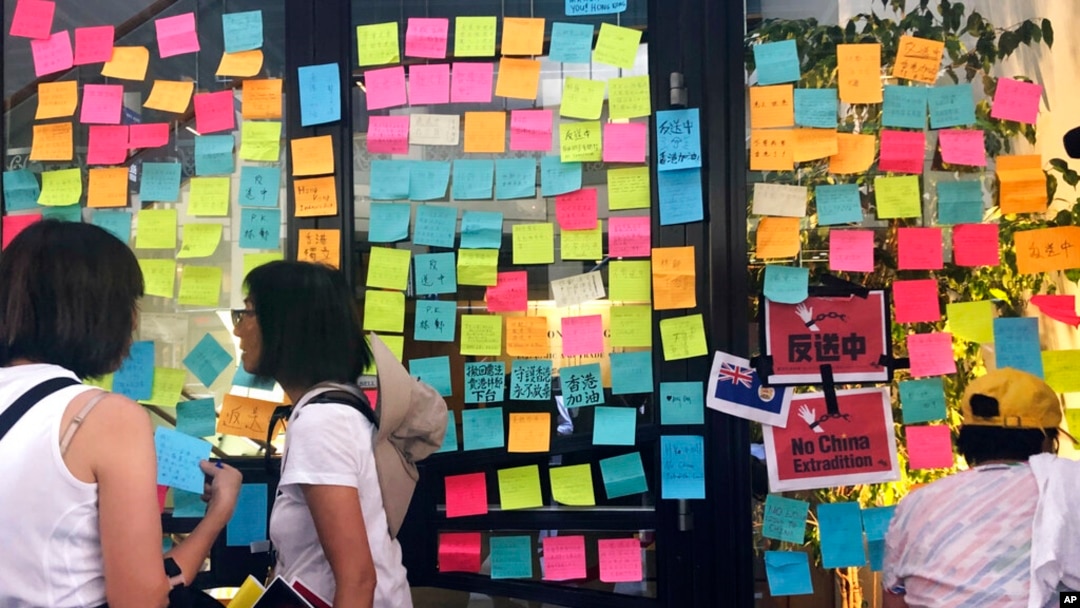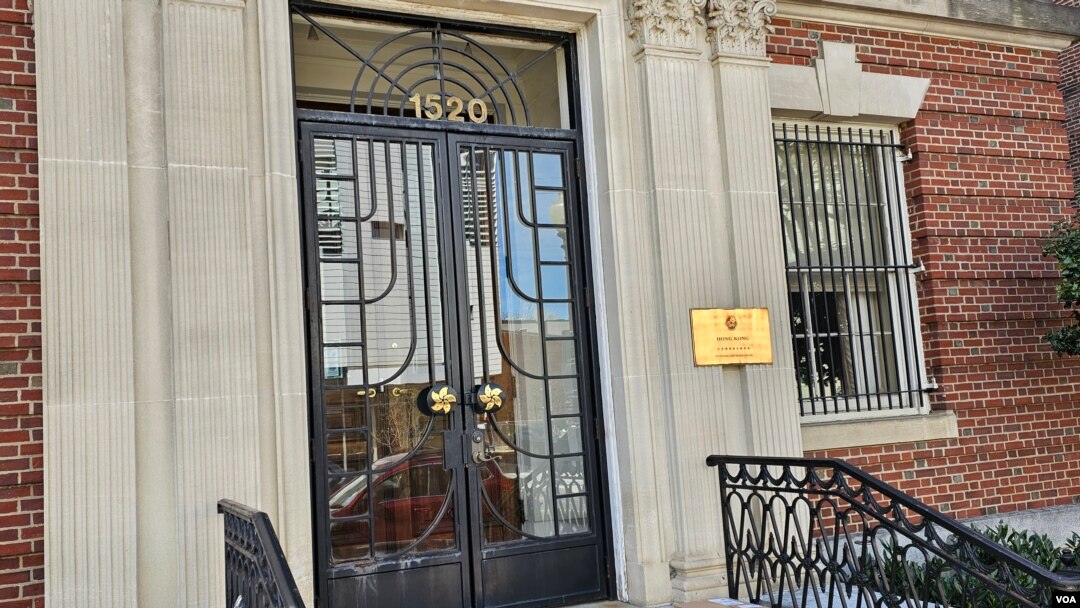The Hong Kong government objects to calls by activists for the city’s economic and trade offices to be closed in the United States.
Hong Kong activists at a congressional roundtable on May 23 called on U.S. lawmakers to pass legislative measures as soon as possible to close the three offices in Washington, San Francisco and New York, describing them as “arms of the propaganda machine” in Beijing.
A Hong Kong Special Administrative Region, or HKSAR, Government spokesperson told VOA on Wednesday that the duties of the Hong Kong Economic and Trade Offices, or ETOs, are to maintain relationships with entities that include local governments and businesses in different sectors to enhance “bilateral ties” and to promote the economic interests of Hong Kong.
Responding to questions from VOA by email, the HKSAR spokesperson said, “ETOs have always been conducting activities righteously and lawfully. The HKSAR Government strongly objects to any unwarranted accusation and malicious slander against the HKSAR Government. Our ETOs will continue to carry out its duties and activities.”
China’s Embassy in Washington also dismissed calls to close Hong Kong’s economic and trade offices in the U.S.
“As overseas economic and trade organizations set up by the HKSAR [Hong Kong Special Administrative Region] Government, HKETOs [Hong Kong Economic and Trade Offices] have run smoothly, which is win-win to the economic and trade cooperation between Hong Kong and relevant countries and regions. Currently, there are more than 1,200 US companies investing and operating in Hong Kong, and almost all major US financial companies operate in Hong Kong. To politicize the relevant issues will only harm the interests of both sides,” said spokesman Liu Pengyu in an emailed response to VOA.
Activists who attended the discussion May 23 hosted by the House Select Committee on the Chinese Communist Party urged the passing of the Hong Kong Economic Trade Office Certification Act.
The bill has been approved by the Foreign Affairs Committees of both the House of Representatives and the Senate, but it is unclear when it will be voted on.
If voted into law, it would require the U.S. executive branch to certify whether the three Hong Kong offices are worthy of extending the diplomatic privileges, exceptions and immunities they currently enjoy within 30 days.
If the White House removes the diplomatic rights, the offices would be forced to cease operations within 180 days. If the government allows them to continue to function, the Hong Kong Economic and Trade offices’ rights would be extended for one year or until the next time an assessment is conducted.

FILE - Protesters leave notes in front of the Hong Kong Economic and Trade Office in San Francisco, June 9, 2019. Hong Kong activists on May 23, 2024, called on U.S. lawmakers to close the office, as well as ones in Washington and New York.
Francis Hui, policy and advocacy coordinator at the Committee for Freedom in Hong Kong Foundation, argued, "Since Hong Kong is no longer autonomous from China, the Chinese Communist Party should not have two diplomatic representations in the United States.
"They (the Hong Kong Economic and Trade Offices) have been promoting some untrue stories about Hong Kong all over the world. They will say that Hong Kong is very developed, charming and bright. They also say that we are an international financial center. Come and trade with us. In fact, they are whitewashing the fact that they are committing some human rights violations and undermining the rule of law in Hong Kong," she told VOA.
Joey Siu, a Hong Kong human rights activist, said, "[Hong Kong Economic and Trade Offices] are the extended branches of the CCP. … They are the arms of the propaganda machine. They are the overseas police stations of the Hong Kong government that surveils and spies on Hong Kong activists and American citizens."
Both Hui and Siu are on the Hong Kong government's wanted list, accused of inciting secession, inciting subversion and colluding with foreign forces. Siu is an American citizen born in the U.S.
Members of Congress from both parties at the roundtable expressed concerns about the deteriorating rights situation in Hong Kong.
Rep. John Moolenaar, the Michigan Republican Chairman of the committee, opened the meeting by stating that many people may be curious: “With so much happening in the world, why should Americans care about Hong Kong? Why should we worry about what the Chinese Communist Party (CCP) is doing?”
He then replied, "The answer is that the core values of the American people are at stake. When the CCP breaks its word to respect the freedom of Hong Kong through one country, two systems, it is breaking its word to the entire world."
One country, two systems was the political structure Beijing agreed to uphold when Hong Kong’s colonial ruler, Britain, transferred the city back to China in 1997.
Critics say Beijing has violated that deal in forcing harsh security laws on Hong Kong that have seen independent media shut down or leave the city, and dissidents arrested or flee abroad.
Beijing says Hong Kong’s 2020 National Security Law was needed to maintain stability, but has used it to arrest, jail and try hundreds of pro-democracy activists, stifling Hong Kong’s once vibrant civil society and tradition of public speech.
Illinois Democrat Rep. Raja Krishnamoorthi criticized Beijing for breaking its commitment to Hong Kong.
"We were promised one country, two systems. Instead, what we see is one country, one system, one party, one ruler: (President) Xi Jinping. One man has decided that Hong Kong is no longer going to abide by what was promised to the rest of the world," he said.
Chinese Embassy spokesman Liu also dismissed those concerns, in the Embassy’s reply to VOA. “Since Hong Kong’s return to the motherland, the principles of ‘one country, two systems,’ ‘Hong Kong people administering Hong Kong’ and ‘Hong Kong enjoying a high degree of autonomy’ have been effectively implemented,” it read. “Hong Kong has a solid position as an international financial, shipping and trading center, and enjoys rapid development of innovative and technological industries, great freedom and openness, and a world-class business environment. The achievements in the practice of ‘one country, two systems’ are globally recognized.”
In March, Hong Kong lawmakers unanimously and quickly approved their own sweeping national security law known as Basic Law Article 23, strengthening the government's ability to silence dissent.
SEE ALSO: Hong Kong Passes Homegrown National Security Law, Sparking International BacklashThe law supposedly aims to combat "treason, rebellion, sedition, theft of state secrets, espionage, sabotage, and foreign interference" with punishment of up to life imprisonment, if found guilty.
But critics say authorities will use the national security measures to further restrict Hong Kong's freedoms at Beijing's behest.
On Tuesday, Hong Kong authorities made the first arrests under Article 23, charging six activists with “incitement with intent.”
Jonathan Price, one of the lawyers for imprisoned Hong Kong media tycoon Jimmy Lai, attended the Thursday roundtable. He said, "A robust rule of law and free media are essential for Hong Kong's future. … Hong Kong can seek to demonstrate these values by releasing Jimmy Lai immediately, and that's what we call upon it to do."
Lai, the 76-year-old founder of Hong Kong's Next Media, was charged under the Hong Kong version of China’s National Security Law with "conspiracy to collude with foreign forces" and "conspiracy to publish incitement” for supporting Hong Kong’s 2019 pro-democracy movement.
If found guilty, he could be sentenced up to life in prison. Lai, who is also a British citizen, has pleaded not guilty to all the charges.
New Jersey Republican Rep. Chris Smith and New York Democrat Rep. Tom Suozzi introduced a bill in April to rename the short section of the street in front of the Hong Kong Economic and Trade Office in Washington, D.C. to Jimmy Lai Way to honor Lai.
SEE ALSO: US Congress seeks to change Hong Kong office address to Jimmy Lai WaySeparately, Britain on Friday charged the manager of the Hong Kong Economic and Trade Office in London, 63-year-old Chung Biu Yuen, and another man with spying for Hong Kong and set a trial date for next February. A third suspect also charged in the case was found dead Sunday in a park. British police have indicated they are investigating it as a suicide.
SEE ALSO: Briton charged in Hong Kong foreign intelligence case found deadChina’s Foreign Ministry Spokesman Wang Wenbin, at a regular briefing May 24 in Beijing, lambasted the charges as Britain’s attempt to vilify China in the name of national security.
VOA’s Adrianna Zhang contributed to this report.


